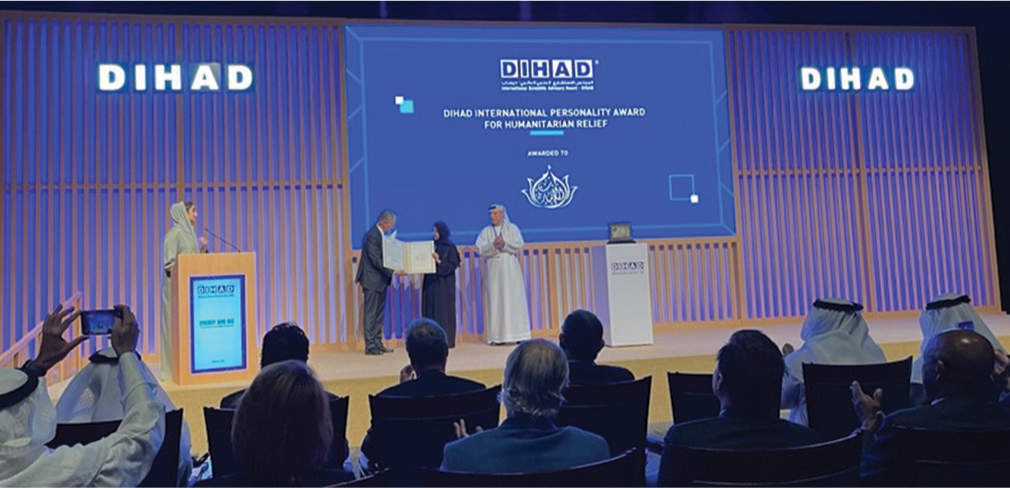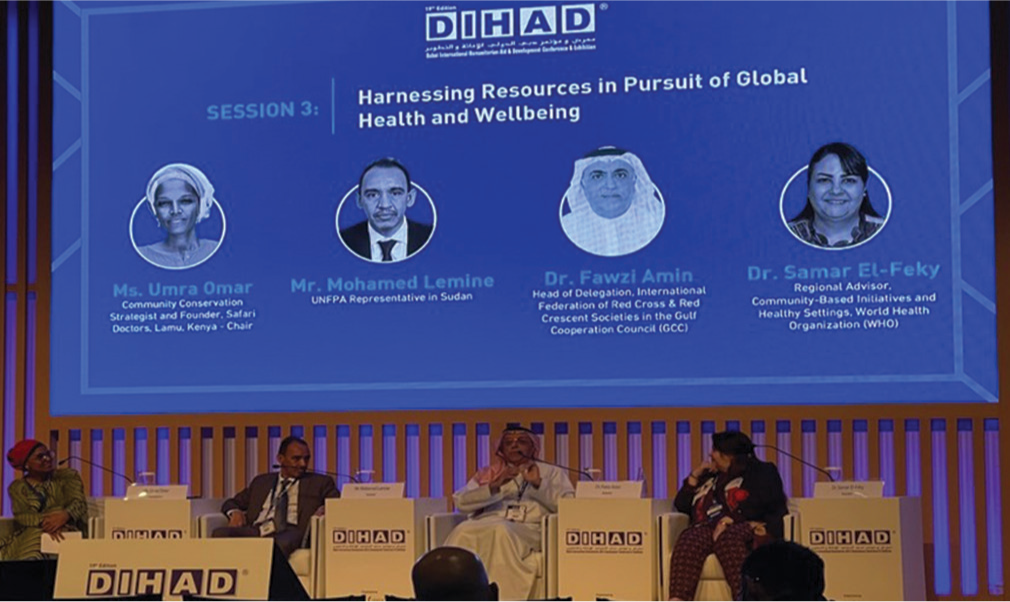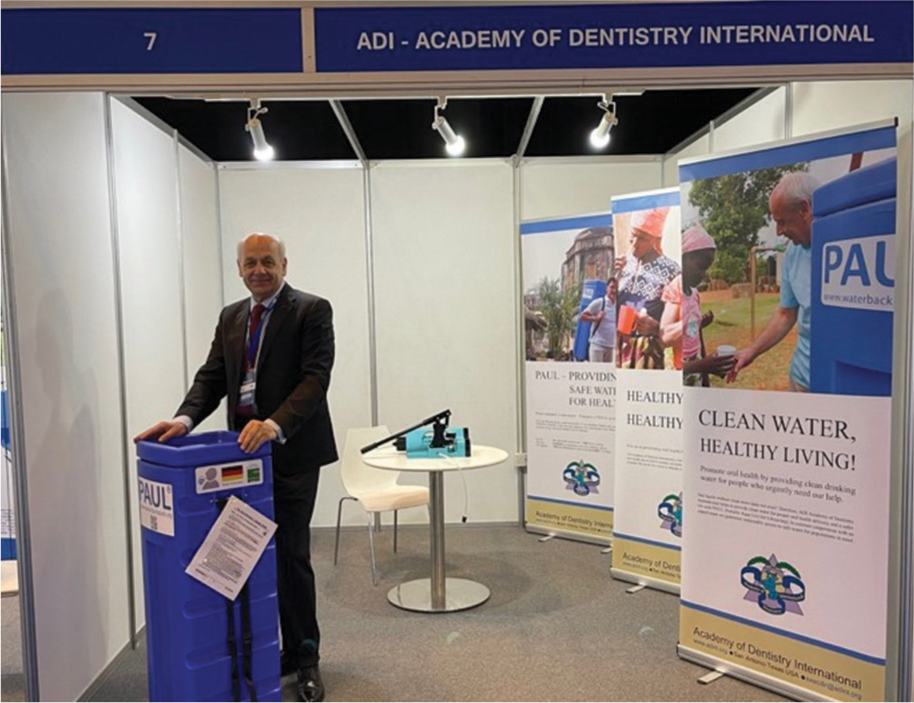ADI’s continuum at the 19th Dubai International Humanitarian and Aid Development Conference and Exhibition

It is the second time that the Academy of Dentistry (ADI), has represented dentists, the oral health profession by definition, at the 19th Meeting of the Dubai International Humanitarian and Aid Development Conference and Exhibition (DIHAD). The venue took place from the 13th to the 15th of March 2023 in Dubai, United Arab Emirates. This year’s title was ENERGY AND AID: capitalizing on available resources.

DIHAD Conference and Exhibition is organized by INDEX Conference and Exhibitions, which organizes also the United Arab Emirates Dental Exhibition and Conference (AEEDC). ADI’s long standing collaboration with AEEDC has been continued with the presence of Middle-East Regent Dr. Kaveh Seyedan and his Vice-regent Dr. Dilip Kumar in February this year. In 2023, ADI was represented for the second time at DIHAD by its Immediate Past-president Dr. Gerhard Konrad Seeberger. The Academy has been offered a booth, and a VIP registration and has participated in the Innovation Workshop with Dr. Seeberger’s lecture on the safe ways to water for sustainable health and oral health. DIHAD has been a magnet for almost 7000 participants and is supported by the United Nations and the World Health Organization. It has the aegis of the Vice-president and Prime Minister of the United Arab Emirates and Ruler of Dubai Mohammed bin Rashid Al Maktoum who is the founder of Dubai International Humanitarian City (IHC), the largest humanitarian hub in the world. IHC is in close collaboration with DIHAD.

H.E. Dr. Maisha Bint Salem Al Shamsi, Minister of State has been the keynote speaker of the Opening Ceremony of DIHAD. She has been conferred the DIHAD International Personality Award for Humanitarian Relief for her numerous contributions to children and their families on the move by H.E. Ambassador for the Parliamentary of the Mediterranean of Gulf Cooperation Council Dr. Abdul Salam Al Madani, Group-CEO of INDEX Holding, DIHAD and DIHAD Foundation and H.E. Mr. Gerhard J. W. Putman-Cramer CEO of DIHAD Sustainable Humanitarian Foundation, Ambassador and Permanent Observer of the Parliamentary Assembly of the Mediterranean to the United Nations and other International Organizations in Geneva.

Dr. Al Shamsi has been followed by H.E. Dr. Hamdan Al Mazrouie, Chairman of Board of Directors of United Arab Emirates Red Crescent on behalf of H.H. Sheikh Hamdan Bin Zayed Al Nayhan, President of UAE Red Crescent, H.E. Dr. Hamad Al Sheikh Ahmed Al Shaibani, the Director General of the Islamic Affairs and Charitable Activities Department, H.E. Dr. Nivine El-kabbag, Minister of Social Solidarity, Arab Republic of Egypt, H.E. Mr. Michael Koehler, Director General of European Commission’s Department for Civil Protection and Humanitarian Aid Operations, and Mr. Ramesh Rajasingham, Director Coordination Division UNOCHA, speaking on behalf of H.E. Mr. Martin Griffith UN Under-Secretary General for Humanitarian Affairs and Emergency Relief Coordinator.
339 million people will need health and other assistance and protection, for which the UN estimates US$ 51 billion to cater for these needs. Less than half of this amount is covered. In addition, the world is facing structural challenges and the biggest one is climate change. The impact of climate change will double the number of people who will need assistance to 200 million. Climate change worsens droughts and floods, and it will impact more people in a more negative manner, including poverty, hunger, and inequalities, as we know it by now.

17 million volunteers are active in the Red Cross and Red Crescent – the pendant of the Red Cross in Islamic states – are active globally, and 2 million Swiss francs have been spent for training 2 million health-care workers, said Dr. Fawzi Amin, Head of Delegation of International Federation of Red Cross and Red Crescent Societies in the Gulf Cooperation Council.
For the Global Health Framework, engaging civil societies and communities is key to sustainable health. An improving community, besides increasing the number of health-care workers, must leverage its capacity, its organization, and its facilities to respond adequately to its health needs. In an improving community, only 30% is the responsibility of the health sector; the remaining 70% is divided into safe water, education, and environmental issues. To achieve improvement breaking, a silo mentality in professional groups is the dictate of the hour, concludes Dr. Amin. Dr. Samar El-Feky, Regional Technical Officer for Community-Based Initiatives and Healthy Settings World Health Organization, Regional Office of Eastern Mediterranean, Cairo, stated that there are discussions in her office to compensate women cooking as health-care workers as they take care of their communities’ health in schools and other community facilities, and midwives are trained to take care of reproductive health and, in addition, in primary care. Initiatives of microfinancing have been started with community boxes that provide money to support women in need.
Dr. Seeberger has participated also in the Session Harnessing Resources in Pursuit of Global Health and Wellbeing. Part of the podium speakers were the Chair of the Session, Ms. Umra Omar, Community Conservation Strategist and Founder of Safari Doctors, Lamu, Kenia, Mr. Mohamed Lemine, UNFPA Representative in Sudan, Dr. Fawzi Amin, and Dr. Samar ElFeky.
In conclusion, Dr. Amin has listed six points.
Focus on infectious diseases: COVID-19 has caused almost 7 million deaths in 3 years, out of which 90% in Africa, a continent already counting 400,000 deaths caused by malaria. We need to invest in prevention, preparedness, research, and development.
NCDs and suicide count for 70% of all deaths globally: Prevention, early diagnosis and correct use of financial resources can significantly change the situation.
Maternal and child health need more attention: 800 women die per day globally during delivery. Vaccination, safe water, and healthy nutrition must catch the attention of bankers and funders.
Availability of essential medicine: The Red Cross and Red Crescent are increasing their delivery of quality medicines. Health is linked to poverty, a weak economy, and scarce education. Only if the social determinants of health are understood and the UN Sustainable Development Goals are seriously approached there will be development
Air pollution: 90% of the global air is polluted, and it will have an influence on communicable and noncommunicable diseases. Triple “A” Accessibility, Affordability, and Availability must be guaranteed for any kind of care. Technology can make an effective change.
Energy: Simple measures, such as walkways for safe walking and going by bicycle instead of using the car contribute, besides saving energy, also to lessen air pollution.
“It is important to join the efforts, measure the efforts, and publish them on the media while making global health sustainable.”

The ADI Immediate Past-president has had many opportunities to speak to key people of the UN and the WHO, besides representatives of other regional organizations. Among them, Dr. Mamar Merzouk from the UN World Food Program, Mr. Othman Belbeisi from UN Migration, Director of ME and North Africa Office, Mr. Khaled Khalifa, from the United Nations High Commissioner for Refugees, Representative to the Gulf Cooperation Council Countries, H.E: the Ecumenical Archbishop of Pentecostal Assemblies of Zimbabwe H.E. Muparutsa Never, and many other leaders and representatives of humanitarian and aid organizations from Africa, the Middle East, the Eastern Mediterranean and Bangladesh, India and Sri Lanka, Gerhard K. Seeberger had also the opportunity to talk with Dr. Afaf Meky, the Executive Manager of Smile Train, an NGO taking care of cleft palate patients in low- and low-middle-income countries in the Middle-East.

The ADI Booth was managed by Dr. Seeberger and Mr. Dinu Kavagem. Many have appreciated the simplicity of the water filtering device PAUL, the Portable Aqua Unit for Lifesaving, working with the only force of gravity. In line with the 2023, title of DIHAD ENERGY AND AID: capitalizing on available resources, Gerhard Seeberger was lecturing at the DIHAD 2023 Innovation Workshop on The Ways to Safe Water for Health and Oral Health. Energy-saving ways to produce safe water were presented and included 3D nets to extract humidity from the air and the WARKA tree using the same principle.



During the closing ceremony, I appreciated most the summarizing sentence for the DIHAD 2023 of H.E. Mr. Gerhard J. W. Putman-Cramer CEO of DIHAD Sustainable Humanitarian Foundation, Ambassador and Permanent Observer of the Parliamentary Assembly of the Mediterranean to the United Nations and other International Organizations “We need to understand that delivering humanitarian aid for peoples’ health is composed by 50% of medicine and 50% of behavior!” Another exciting experience in the world of global charity and proud to represent ADI as an oral health professional par excellence, a dentist, in Dubai. I would be very happy to be accompanied at the 20th Edition of DIHAD to be held in Dubai, UAE, from April 23rd to 25th.

Humbly delivered, September 09th, 2023:





